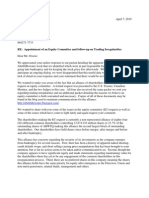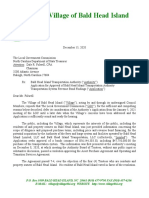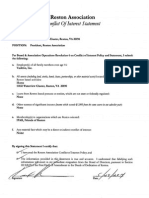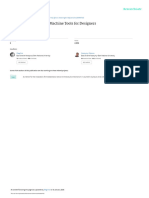What You Need To Know About The Westbury Park Transition
What You Need To Know About The Westbury Park Transition
Uploaded by
api-133522662Copyright:
Available Formats
What You Need To Know About The Westbury Park Transition
What You Need To Know About The Westbury Park Transition
Uploaded by
api-133522662Original Title
Copyright
Available Formats
Share this document
Did you find this document useful?
Is this content inappropriate?
Copyright:
Available Formats
What You Need To Know About The Westbury Park Transition
What You Need To Know About The Westbury Park Transition
Uploaded by
api-133522662Copyright:
Available Formats
What
You Need to Know about the Westbury Park Transition
James N. Richardson, Jr. (J.R. Richardson), by and through an entity called Plantation Properties, LLC (PPL) started the Westbury Park community in the 1990s. PPL sold numerous lots to developer/builder D.R. Horton early on in the development, and D.R. Horton built numerous homes in Westbury Park. Westbury Parks declarant is PPL, whose managing member is Richardson. Although the community was built out in the mid 2000s, the developer still appoints three members of a five member Board of Directors, and retains considerable authority, including veto power. Until a little over a year ago, Board meetings were not held regularly or noticed to homeowners. Board members were inexplicably reluctant to homeowner attendance or participation. Homeowners were allowed to attend highly orchestrated annual meetings. At one point, the management company since inception, Property Administrators, Inc., (PAI), would not even provide the names of Board members upon request. A small group of homeowners clamored for more transparency, and in the fall of 2011, the community selected its two elected member representatives, Ward Borden and Jason Watts, to represent the homeowners interests; at the insistence of the new homeowner-elected Board members, monthly Board meetings since then have been open to homeowners. When the new Board came into existence September 2011, the developer, Richardson, resigned as a director, a position he had held for the entire existence of the Board. The new homeowner elected Board president, under the authority of the bylaws, created committees. Upon best knowledge, no such committees had been created in the 12 years prior. PPL now wants to transition the development to the homeowners with a reserve fund of unknown adequacy, and aged infrastructure. The management company has not furnished requested records to the Finance Committee. In reviewing what contract documentation PAI reluctantly provided the Finance Committee, there appear to be many questions:
1. In twelve years, the Association has not had an audit. 2. In twelve years, the Association has not had a reserve study.
3. Annual Reports submitted to the SC Department of Revenue for 4. The Association files Federal and state tax returns; the copies PAI
multiple years did not identify directors and officers.
furnished the Finance Committee have been skeletal, with unexpected contents. 5. Association bank accounts have been, for a number of years, at Coastal States Bank where Richardson is a director. In 2011, the FDIC placed restrictions on Coastal States bank. Neither the then constituted Board or the management company notified the members of the banks status. 6. At the December 2011 Board meeting, the new Board president, in trying to figure out where Association money is, asked the management company representative if the Association had any bank accounts at any other institutions besides Coastal. The PAI representative responded: Nnnnot to my knowledge, um unless something's . . . no. No, I don't, I don't think so. The only other possibility that would be something anything different is if anything's moved over to the um, um Community Association Banc . . . but I don't think that you've ever -- I don't think you've done that, at this point in time. About 10 days after the meeting, the newly elected Board president and treasurer, along with homeowners, learned of the existence of accounts at Community Association Banc/Mutual of Omaha Bank via the mailing of 2012 membership dues information. Subsequently, the Finance Committee obtained evidence of Association accounts existing at this bank since August 2011. The Finance Committee later requested a list of all former and existing bank accounts and has yet to receive the information and there is no any indication they will. 7. The Association apparently has at least five accounts at Coastal States Bank and apparently also has three accounts at Mutual of Omaha. The general ledgers reveal excessive bank fees, confusing accounting and a lot of to and from, back and forth, transactions. 8. In reviewing information, the Finance Committee had questions about expenses. For example, the Association had paid excessive South Carolina DHEC pool permit fees. It turns out that fees were paid on behalf of another association from the Westbury Park account. Homeowners can draw their own conclusions about the effectiveness of property management. 9. The debt write-offs practices have been a source of confusion to some new board members. PAI contracted with a collection company. However, the general ledger shows the Westbury Park Association paying fees to the collection company.
Page 2 of 4
10. The developer still maintains ownership of common area property
11.
12. 13.
14.
15.
16.
17.
throughout the community such as multiple parks, a swimming pool, exercise center and pavilion. The Homeowners Association paid thousands of dollars in property taxes on this developer owned property for, as of yet, an unverified period consisting of years. If Richardson had deeded the property to the Association, County property taxes could have been calculated at a much lower "Community Association" rate. For example, the Association's annual tax liability for one of the parcels could have been closer to $200 rather than $12,000. Attorney Mr. Robert (Bob) Deeb, who represented, upon best information, the Association during the summer of 2011, is now representing the management company. The Association was/is in negotiation with the developer for transition of the community to the homeowners. A developer designee Board member has objected to records requested by the Treasurer being produced in full to the Treasurer. Lists of Westbury Capital Improvements provided by PAI for 2010 and 2011 show expenditures for improvements that appear to be maintenance. Vendor contracts appear not to have been properly executed in some instances. There is some question if unlicensed/uninsured contractors were hired to work at Westbury Park. Competitive bids were not sought for many years. In reviewing the Associations contract with Hargray, the local cable, phone and Internet service provider, the Association had numerous separate accounts, lapsed from a contact status in 2008; homeowners were overpaying. Additionally, the Association was paying for services the community was not receiving; e.g., paying for 10 Mbps of Internet service and receiving one Mbps. An exclusive license agreement for a period of 15 years grants licensor (Richardson) a percentage of the gross subscriber service revenues earned by Hargray cable for services provided within the development. Westbury Park homeowners have had the ability to use the services of only one cable TV company. In 2010, the prior Board contracted to significantly expand a playground in one of the common area parks. After construction, unanswered questions existed. When the new Board came into existence in September 2011, and a Finance Committee was created, the Committee in their review of the general liability insurance policy for the Association realized that the expanded playground was not insured. The new Board president, Ward Borden, followed up to make certain insurance coverage was in place. The management company owner has an American Express card that management company staff used to make purchases, allegedly on behalf of our homeowner Association. There is evidence of payment
Page 3 of 4
Additionally: 1. At annual meetings from the early-2000s on, homeowners advocated being able to install new wells for irrigation purposes instead of leasing from PPL at what seems a rapacious rate of return to the developer after initial cost. The developers initial cost to install the wells was around $25,000. With PPL charging the Association $33,600 a year for the irrigation water, homeowners have paid about $400,000 for the non- potable water. The Association pays all of the costs of electricity for these wells; the developer is selling the Association water from the aquifer. 2. At the September 2011 annual meeting, the new Board president informed all members present that the declarant deeded ingress/egress rights to the main entry street in the development to what is now The Estate of Westbury. In exchange, the declarant receives a yearly perpetual fee paid by the complex to Plantation Properties, LLC. Then, PPL pays approximately one third ($36,000) annually to Westbury Park Residential Association. The portion paid to PPL is calculated annually and is tied to inflation. The portion paid to Westbury Park remains stagnant. The very next day after PPL deeded this easement for the above-described fee, PPL deeded the underlying road to the Westbury Park Residential Association. Accordingly, the wear and tear of this road, drastically increased by the easement given to the apartments, has occurred during the Associations ownership. The $36,000 has not been earmarked and escrowed for the road upkeep and maintenance. 3. Upon closing, owners pay a $250 - $500 capital reserve fee along with a $35 fee to PAI. We lack an accounting of these funds. 4. At the February 16, 2012 Board meeting, the developers attorney, Mr. John (Jack) Qualey, showed up without notice. The developers attorney, and the developer designees interacted. Director Ward Borden questioned the appropriateness of these interactions.
from the Association checking account to the credit card company. It is for owners to decide whether this is appropriate.
Page 4 of 4
You might also like
- 108 PBM #2 Winter 2015 Part 2Document5 pages108 PBM #2 Winter 2015 Part 2Ray0% (1)
- Business Ethics ExerciseDocument4 pagesBusiness Ethics Exercisedeltsen0% (3)
- Hoa Rules and RegulationsDocument21 pagesHoa Rules and Regulationsapi-235187959100% (1)
- Rico Lawsuit FiledDocument525 pagesRico Lawsuit FiledMyrtleBeachSC news100% (2)
- AFCC Court Cancer Metastacizes: A Guide To Destroying ChildrenDocument10 pagesAFCC Court Cancer Metastacizes: A Guide To Destroying ChildrenJournalistABC100% (3)
- 4Document22 pages4Daily Caller News FoundationNo ratings yet
- Letter To Mayor Kristin JacobsDocument4 pagesLetter To Mayor Kristin JacobsMy-Acts Of-SeditionNo ratings yet
- Departments of Veterans Affairs and Housing and Urban Development and Independent Agencies Appropriations For Fiscal Year 2004Document79 pagesDepartments of Veterans Affairs and Housing and Urban Development and Independent Agencies Appropriations For Fiscal Year 2004Scribd Government DocsNo ratings yet
- Affidavit of Daniel HayesDocument10 pagesAffidavit of Daniel Hayesshaprioliar666No ratings yet
- A Failure of Oversight Lompoc Housing and Community Development CorporationDocument18 pagesA Failure of Oversight Lompoc Housing and Community Development Corporationjdevries3560No ratings yet
- Impact - Hope. OpportunityDocument7 pagesImpact - Hope. OpportunityBrendaBrowningNo ratings yet
- Attorney StatementDocument15 pagesAttorney Statementshaprioliar666No ratings yet
- Museum of Arts and Culture InvestigationDocument22 pagesMuseum of Arts and Culture InvestigationDanielWaltersNo ratings yet
- LOLES Gregory AffidavitDocument9 pagesLOLES Gregory AffidavitEditor, Hartford CourantNo ratings yet
- Attorneys For The Christian Brothers' Institute, Et Al. Debtors and Debtors-in-PossessionDocument26 pagesAttorneys For The Christian Brothers' Institute, Et Al. Debtors and Debtors-in-PossessionChapter 11 DocketsNo ratings yet
- United States Court of Appeals, Fourth CircuitDocument10 pagesUnited States Court of Appeals, Fourth CircuitScribd Government DocsNo ratings yet
- MN GOP Oversight ReportDocument20 pagesMN GOP Oversight ReportMinnesota Public RadioNo ratings yet
- United States v. R. Peter Stanham, 11th Cir. (2010)Document44 pagesUnited States v. R. Peter Stanham, 11th Cir. (2010)Scribd Government DocsNo ratings yet
- Lee Muller Statement - United States Bankruptcy Court Eastern District of MichiganDocument52 pagesLee Muller Statement - United States Bankruptcy Court Eastern District of MichiganCaleb HollowayNo ratings yet
- HOAminutesDocument2 pagesHOAminutescarladjNo ratings yet
- Complaint Against Jay Jacobs and Nassau Democratic CommitteesDocument43 pagesComplaint Against Jay Jacobs and Nassau Democratic Committeesrebellando10100% (1)
- Cordillera Golf Club, LLC The Club CordilleraDocument4 pagesCordillera Golf Club, LLC The Club CordilleraChapter 11 DocketsNo ratings yet
- House Oversight Committee Releases Evidence in Biden Family Investigation - Bank Records Memo 3.16.23Document4 pagesHouse Oversight Committee Releases Evidence in Biden Family Investigation - Bank Records Memo 3.16.23Jim Hoft100% (1)
- CREW Payday Lenders Report 2011Document10 pagesCREW Payday Lenders Report 2011CREWNo ratings yet
- Meridian Fraud ReportDocument100 pagesMeridian Fraud ReportNye LavalleNo ratings yet
- BC September 21-09Document3 pagesBC September 21-09Shawna GentryNo ratings yet
- LYNN E. SZYMONIAK - Trust Assignment Fraud Letter To SEC - 2Document6 pagesLYNN E. SZYMONIAK - Trust Assignment Fraud Letter To SEC - 2fox23434No ratings yet
- Order On Respondents' Motion For Summary Disposition and Motion To DismissDocument15 pagesOrder On Respondents' Motion For Summary Disposition and Motion To Dismisscrichert30No ratings yet
- Open Letter To Lee May From DeKalb StrongDocument2 pagesOpen Letter To Lee May From DeKalb StrongThe Brookhaven PostNo ratings yet
- Question G - Letter To Routt Sheriff - R JohnsonDocument6 pagesQuestion G - Letter To Routt Sheriff - R JohnsonNite OwlNo ratings yet
- 2015 HOA MTG NotesDocument2 pages2015 HOA MTG NotesMonina JonesNo ratings yet
- Ang V AngDocument33 pagesAng V Angkrys_elleNo ratings yet
- The News TimesDocument2 pagesThe News Timesjon peltoNo ratings yet
- First National City Bank, Etc., and Berry, Selvey & Cia, Etc. v. Calvin Gale Berry and Leo Joseph Selvey, 421 F.2d 880, 1st Cir. (1970)Document6 pagesFirst National City Bank, Etc., and Berry, Selvey & Cia, Etc. v. Calvin Gale Berry and Leo Joseph Selvey, 421 F.2d 880, 1st Cir. (1970)Scribd Government DocsNo ratings yet
- Moot Proposition - 9th Zenith Internal Moot Court Competition 2024Document4 pagesMoot Proposition - 9th Zenith Internal Moot Court Competition 2024Suryansh ModiNo ratings yet
- Duane EC LetterDocument4 pagesDuane EC LetterergodocNo ratings yet
- Florida HOA Laws A Comprehensive GuideDocument1 pageFlorida HOA Laws A Comprehensive Guidejoshuah2415No ratings yet
- Business Loan ApplicationDocument4 pagesBusiness Loan ApplicationRocketLawyer100% (1)
- Duane EC LetterDocument3 pagesDuane EC LetterergodocNo ratings yet
- (15-00293 218-4) Ex D 02-06-2017 Letter From B. Tantillo To C. PistilliDocument8 pages(15-00293 218-4) Ex D 02-06-2017 Letter From B. Tantillo To C. Pistillilschneider68No ratings yet
- 025 - The Maine Republic Free State TrustDocument3 pages025 - The Maine Republic Free State TrustDavid E Robinson50% (2)
- Beth Knezevich Candidate QuestionnaireDocument2 pagesBeth Knezevich Candidate QuestionnaireDevon UrchinNo ratings yet
- Village Council Letter To LGCDocument4 pagesVillage Council Letter To LGCJohanna Ferebee StillNo ratings yet
- Acc Summer 2011Document4 pagesAcc Summer 2011ramona_acosta_1No ratings yet
- Section B-Question-3: Special Commissioners of Income Tax V Pemsel (1891) Leahy V A-G For New South Wales (1959Document16 pagesSection B-Question-3: Special Commissioners of Income Tax V Pemsel (1891) Leahy V A-G For New South Wales (1959AjithNo ratings yet
- LMU Board Meeting October 7, 2009 MinutesDocument6 pagesLMU Board Meeting October 7, 2009 MinutesOaklandCBDsNo ratings yet
- EGR Response Re - Host Committee LetterDocument3 pagesEGR Response Re - Host Committee LetterjmicekNo ratings yet
- Report of Investigation RichwoodDocument189 pagesReport of Investigation RichwoodAnna MooreNo ratings yet
- United States Court of AppealsDocument8 pagesUnited States Court of AppealsScribd Government DocsNo ratings yet
- 2015 BCCA 247 Louie v. LouieDocument17 pages2015 BCCA 247 Louie v. LouieCrestonEditorNo ratings yet
- RA Board of Directors Conflict of Interest Statements-1Document15 pagesRA Board of Directors Conflict of Interest Statements-1Terry MaynardNo ratings yet
- Apse Shareholder Derivative Action ComplaintDocument14 pagesApse Shareholder Derivative Action ComplaintDarren Adam HeitnerNo ratings yet
- TRC News and Notes 3-1-12Document1 pageTRC News and Notes 3-1-12James Van BruggenNo ratings yet
- Bethel Watchdog December 2011 NewsletterDocument2 pagesBethel Watchdog December 2011 NewsletterDaniel R. Gaita, MA, LMSWNo ratings yet
- SMBS May 22 MinutesDocument3 pagesSMBS May 22 MinutesLivewire Printing CompanyNo ratings yet
- HOA Warrior: Battle Tactics for Fighting your HOA, all the way to Court if Necessary: HOA WARRIOR, #1From EverandHOA Warrior: Battle Tactics for Fighting your HOA, all the way to Court if Necessary: HOA WARRIOR, #1No ratings yet
- The Essential Nonprofit Fundraising Handbook: Getting the Money You Need from Government Agencies, Businesses, Foundations, and IndividualsFrom EverandThe Essential Nonprofit Fundraising Handbook: Getting the Money You Need from Government Agencies, Businesses, Foundations, and IndividualsNo ratings yet
- Homeowner Associations: What You Should Know Before Buying in an Hoa and How to Become an Effective Hoa MemberFrom EverandHomeowner Associations: What You Should Know Before Buying in an Hoa and How to Become an Effective Hoa MemberNo ratings yet
- Technical Data Sheet & Part ListDocument24 pagesTechnical Data Sheet & Part ListM Farid Fakhrudduja100% (1)
- CasesPdfOpener - Aspx 2Document25 pagesCasesPdfOpener - Aspx 2adninNo ratings yet
- Prelude For Organizational Efficiency: Cost ConsciousnessDocument40 pagesPrelude For Organizational Efficiency: Cost ConsciousnessSankalp SinghNo ratings yet
- AXSWC Connections:: Axswc Vehicle Specific InstructionsDocument4 pagesAXSWC Connections:: Axswc Vehicle Specific InstructionsGilberto Ulisses Leon CarballoNo ratings yet
- A Study On Non Performing Assets at SBI, BengaluruDocument79 pagesA Study On Non Performing Assets at SBI, BengaluruRahul KumarNo ratings yet
- A Web-Based Enrollment Management System For Paisley Garden AcademeDocument2 pagesA Web-Based Enrollment Management System For Paisley Garden AcademeAngela Louise TomasNo ratings yet
- القيادة الأخلاقية وأثرها في تعزيز سلوك المواطنة التنظيميةDocument18 pagesالقيادة الأخلاقية وأثرها في تعزيز سلوك المواطنة التنظيميةAmanj AmanjNo ratings yet
- Placement Policy - 20210106051818Document4 pagesPlacement Policy - 20210106051818MayankNo ratings yet
- Man An Prakash AnDocument25 pagesMan An Prakash Anmayurgharat0% (1)
- 1 PDFDocument41 pages1 PDFChan Peng SwanNo ratings yet
- IAB LCCI Level 1 Bookkeeping Specification From 2024Document22 pagesIAB LCCI Level 1 Bookkeeping Specification From 2024wgbp6jj56dNo ratings yet
- Leave EntitlementsDocument5 pagesLeave Entitlementspradip_jsr13No ratings yet
- 10 March AssignmnetDocument4 pages10 March Assignmnetkevin kipkemoiNo ratings yet
- My Family Routine: Prepa en Línae-SepDocument3 pagesMy Family Routine: Prepa en Línae-SepxxxxNo ratings yet
- Activity 2aDocument6 pagesActivity 2aAndy ReiNo ratings yet
- Natural Gas Pipeline CostDocument85 pagesNatural Gas Pipeline CostLee Hui Yi100% (3)
- Geafol Transformers Dry TypeDocument10 pagesGeafol Transformers Dry Typesunil_031100% (3)
- Lesson 2 Adding DecimalsDocument3 pagesLesson 2 Adding Decimalsapi-636115958No ratings yet
- Financial AssumptionDocument2 pagesFinancial AssumptionRozel LanagNo ratings yet
- Offences Against PropertyDocument14 pagesOffences Against PropertyPritesh KashyapNo ratings yet
- Capital Budgeting SeatworkDocument3 pagesCapital Budgeting SeatworkJazmine Nichole CanlasNo ratings yet
- SUDDICK CY JAMES XDocument3 pagesSUDDICK CY JAMES XITNo ratings yet
- B.Tech Minor Project ReportDocument34 pagesB.Tech Minor Project ReportAryan AroraNo ratings yet
- FAR.2922 - Investments in Equity InstrumentsDocument5 pagesFAR.2922 - Investments in Equity InstrumentsBea San JoseNo ratings yet
- NEC NEoDocument21 pagesNEC NEoStoian FlorinNo ratings yet
- PMFIAS MIH 02 Rise of The Regional StatesDocument31 pagesPMFIAS MIH 02 Rise of The Regional StatesVishantNo ratings yet
- Monograph Parametric Modeling - OS KroolDocument113 pagesMonograph Parametric Modeling - OS KroolTAUFIQ ARIEF NUGRAHANo ratings yet
- Sdm 2023 MayDocument3 pagesSdm 2023 Maymayurphadke5000No ratings yet
- POPLA AppealDocument8 pagesPOPLA Appeal-No ratings yet
- MSME Financing Bangladesh - 10 May 2021 - Share - 0Document61 pagesMSME Financing Bangladesh - 10 May 2021 - Share - 0Ayman MustakimNo ratings yet

























































































